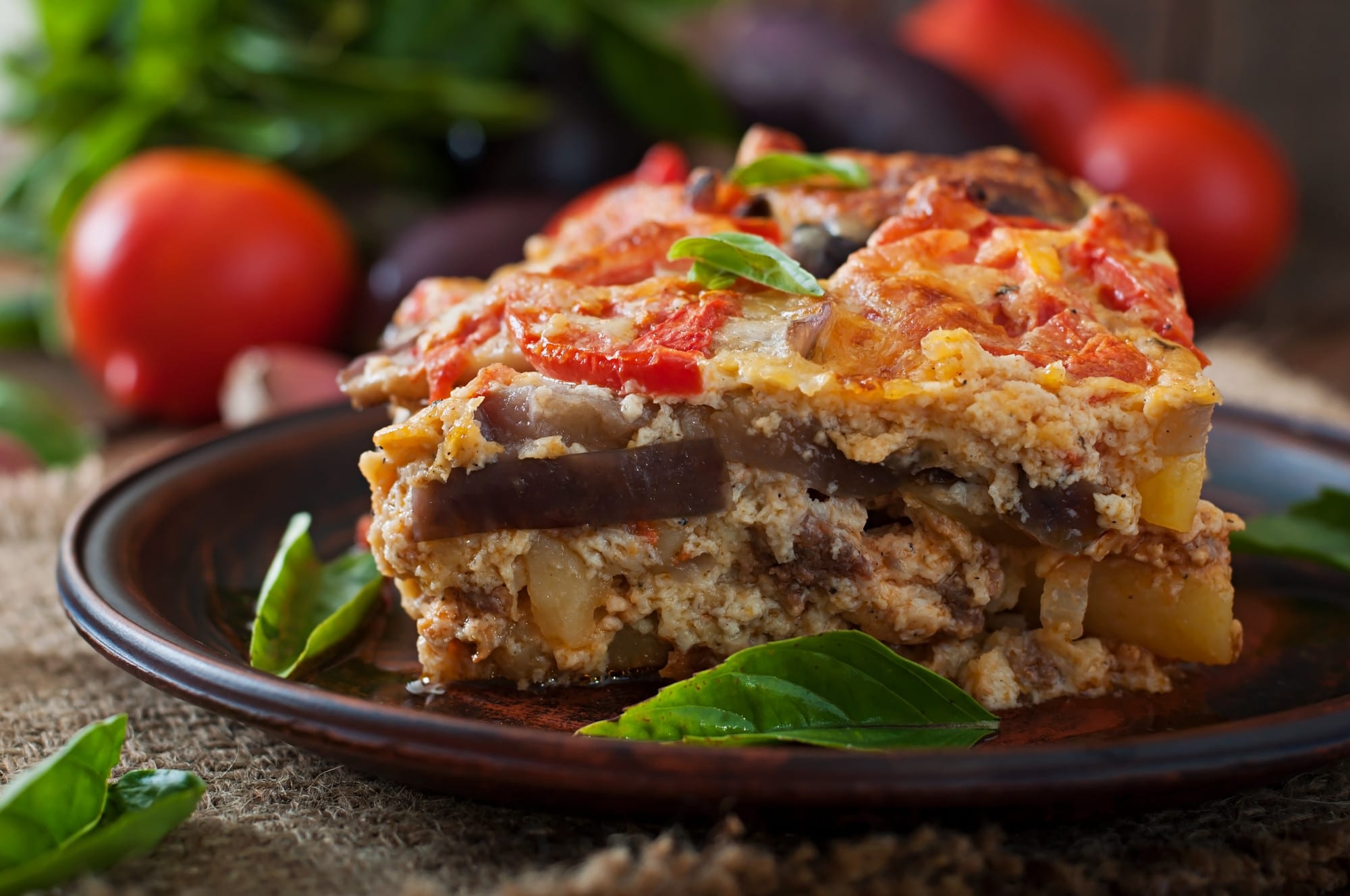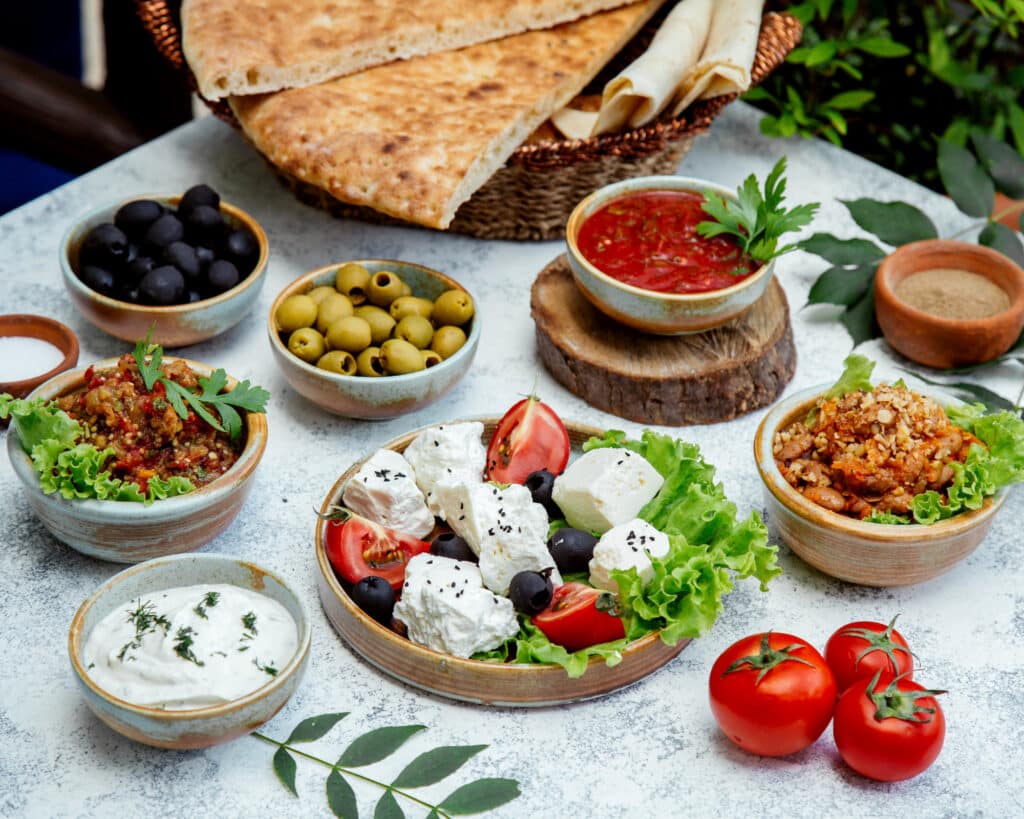Greek is not only the land of gods, but also a home to yum and irresistible food. If you are a foodie, you know that Greek cuisine is famous for its delectable flavours, rich history, and vibrant cultural influences. From the sun-kissed islands to the mainland, Greek food is a delightful fusion of fresh ingredients, Mediterranean influences, and ancient culinary traditions. Today, we will talk about some key characteristics, popular dishes, and regional specialities of Greek cuisine.
What Makes Greek Cuisine Finger Licking Good?
There are several key characters in Greek cuisine that makes it unique and distinct:
- Fresh Ingredients: Greek cooking relies heavily on fresh, seasonal ingredients. Olive oil, fresh vegetables, and herbs are fundamental to most dishes.
- Mediterranean Diet: Greek cuisine is often associated with the Mediterranean diet, which emphasizes the consumption of fruits, vegetables, whole grains, lean proteins, and olive oil. This diet is already famous for its health benefits.
- Herbs and Spices: Greek dishes are flavoured with a variety of herbs and spices, such as oregano, mint, garlic, and lemon. These ingredients add depth and complexity to the flavours, making each dish distinct and flavorful.
- Olive Oil: Greece is one of the world’s largest producers of olive oil. They use olive oil generously in cooking, dressing salads, and even as a dip for bread.
- Diverse Seafood: Given Greece’s extensive coastline and numerous islands, seafood plays a prominent role in Greek cuisine. Octopus, squid, and a variety of fish are common ingredients.
Some Famous Greek Dishes

Greek cuisine boasts an array of mouthwatering dishes that cater to a wide range of tastes. Here are some popular options:
- Moussaka: A beloved Greek dish, moussaka is a layered casserole made with eggplant, ground meat (often lamb or beef), and a creamy béchamel sauce. It’s similar to lasagna but with a Mediterranean twist.
- Tzatziki: This cool and refreshing yogurt-based sauce is a staple in Greek cuisine. Greek yoghurt, cucumbers, garlic, dill, and olive oil are the main ingredients of Tzatziki. Usually, pita bread serves as a condiment for grilled meats.
- Souvlaki: Souvlaki consists of small pieces of marinated and skewered meat, usually pork, chicken, or lamb. They grill it to perfection and serve it in a pita with vegetables and a dollop of tzatziki.
- Dolmades: These are grape leaves stuffed with a mixture of rice, herbs, and sometimes ground meat. They usually serve it with a drizzle of lemon juice.
- Spanakopita: A delicious spinach and feta cheese pie, spanakopita is wrapped in layers of crispy phyllo dough. It’s a savoury, flaky delight.
Greek Cuisine Regional Specialties
Greek cuisine is a celebration of life, and every meal is an opportunity to share love, laughter, and unforgettable flavours. Whether you’re exploring the bustling streets of Athens or relaxing on a picturesque Greek island, the country’s cuisine is sure to leave a lasting impression. So, when you visit Greece, embrace the warmth of its people and savour the delights of its culinary treasures.
Greece’s diverse geography has given rise to unique regional specialities. Here are a few places that are worth your pennies:
- Santorini: This stunning island is known for its exceptional tomatoes and white eggplants. Local dishes like tomato fritters and eggplant-based moussaka are must-try delicacies.
- Crete: The Cretan diet is famous for its health benefits. Try dishes like dakos, a simple but delicious salad made with barley rusk, tomatoes, olive oil, and feta.
- Thessaloniki: Located in Northern Greece, Thessaloniki is famous for its delicious street food, including the famous koulouri, a sesame-covered bread ring.
- Epirus: In the mountainous region of Epirus, you can savour hearty dishes like moussaka made with local ingredients and delicious cheese pies known as “tyropita.”
The Sweet Greek Tooth

No culinary journey through Greece is complete without indulging in its delightful desserts and sweets. Greek desserts often feature a perfect balance of sweet and savoury flavours. Here are some delectable options:
- Baklava: Baklava is a sweet pastry made with layers of thin phyllo dough, filled with a mixture of nuts, spices, and sweet syrup. It’s a symphony of textures and flavours.
- Loukoumades: These golden-brown, honey-soaked with cinnamon and walnuts as sprinklers, these doughnut holes are a favourite among Greeks.
- Galaktoboureko: This dessert consists of layers of crispy phyllo dough filled with creamy custard and drizzled with sweet syrup. It’s both crunchy and creamy, a delightful contrast.
- Koulourakia: These buttery, twisted cookies, often flavoured with vanilla or citrus, are a beloved treat, especially during Easter celebrations.
Greek Beverages And Drinks
Greek cuisine also boasts a variety of refreshing beverages:
- Ouzo: An anise-flavoured liqueur, ouzo is the national drink of Greece. It turns milky white when you mix it with water. Typically they serve Ouzu as an aperitif.
- Retsina: This unique Greek wine is flavoured with pine resin, giving it a distinct taste. It’s a great accompaniment to Greek cuisine, particularly seafood dishes.
- Greek Coffee: Similar to Turkish coffee, Greek coffee is strong and thick, often served with a small glass of cold water. It’s a staple for coffee lovers.

The Blend Of Greek Food In Culture
Greek cuisine is deeply woven into the country’s culture and traditions. Many Greek families have passed down recipes through generations, creating a strong sense of community and a way to preserve their heritage. The concept of philoxenia, or hospitality, is at the core of Greek culture. ALso, in Greece, it is an honour to share a meal with guests, and the act of eating together is a symbol of friendship and warmth.
Furthermore, Greek cuisine also plays a significant role in religious and festive celebrations. They prepare special dishes during holidays and events, such as Easter, Christmas, and weddings. These culinary traditions reflect the deep connection between food, family, and spirituality.
The Future of Greek Cuisine
As Greece continues to evolve and modernize, its cuisine remains rooted in tradition while embracing innovation. Chefs and food enthusiasts in Greece are increasingly exploring new interpretations of classic dishes. They use local and seasonal ingredients to create contemporary Greek cuisine.
The future of Greek food also lies in its growing popularity worldwide. Greek restaurants and Greek-inspired dishes are becoming more accessible globally, allowing people to experience the flavours and culture of Greece no matter where they are.
In a nut shell, Greek cuisine is rich in flavours, traditions, and history. Whether you’re savouring a classic Greek dish in a local taverna, exploring the bustling markets of Athens, or recreating Greek recipes in your kitchen, the culinary journey through Greece is a sensory delight that captures the essence of a country known for its warm hospitality and delicious food.



